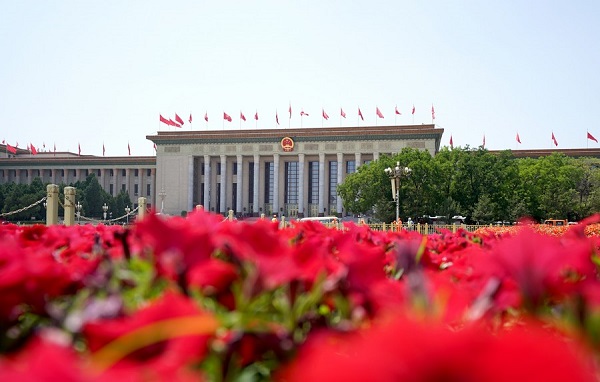Two sessions to chart path for year ahead

File photo shows a view of the Great Hall of the People in Beijing, capital of China. [Photo/Xinhua]
Meetings carry extra weight as journey to a modern socialist country continues
As China, the world's second-largest economy, moves full steam ahead toward building a modern socialist country, the two sessions will once again show the world how the nation of 1.4 billion people is striving to reach that goal.
The two sessions are the annual meetings of the National People's Congress, China's top legislature, and the National Committee of the Chinese People's Political Consultative Conference, its top political advisory body. The gatherings are highlights of China's political calendar as they set the national agenda for the year.
This year's meetings carry extra weight as last year marked a fresh start in China's quest to basically build itself into a modern socialist country by 2035 on the path to comprehensive transformation by 2049, which will mark the centenary of the founding of the People's Republic of China.
"The Chinese often say that we should win at the starting line," said Zhou Hanmin, a national political adviser from Shanghai. "The year 2035 is not far away. We should seize every minute. And therefore it is even more critical to draw up blueprints and answer questions of how to do it better at this year's two sessions."
China remained a stabilizing anchor of the global economy last year, with its GDP growing by 8.1 percent-the fastest growth rate in about a decade.
Per capita disposable income hit 35,128 yuan ($5,545), up 9.1 percent year-on-year in nominal terms.
Rising incomes are tangible for Liu Jianming, a deputy to the 13th NPC from Tangdi, a village in East China's Zhejiang province.
Liu, the village's Party chief, led residents to ride the wave of agritourism and make Tangdi's market gardens a popular tourism destination.
Ninety-five percent of the village's residents are now engaged in gardening-related industries, with their per capita disposable income exceeding 110,000 yuan last year.
"Pinpointing a suitable industry is not enough to boost the economy in mountainous areas. We need talent to keep it prosperous," Liu said, admitting that there is still an urgent need for industrial upgrading in Tangdi.
In the recently published No 1 Central Document for 2022, the first policy statement released by China's central authorities each year, key tasks were outlined to comprehensively advance rural vitalization this year.



